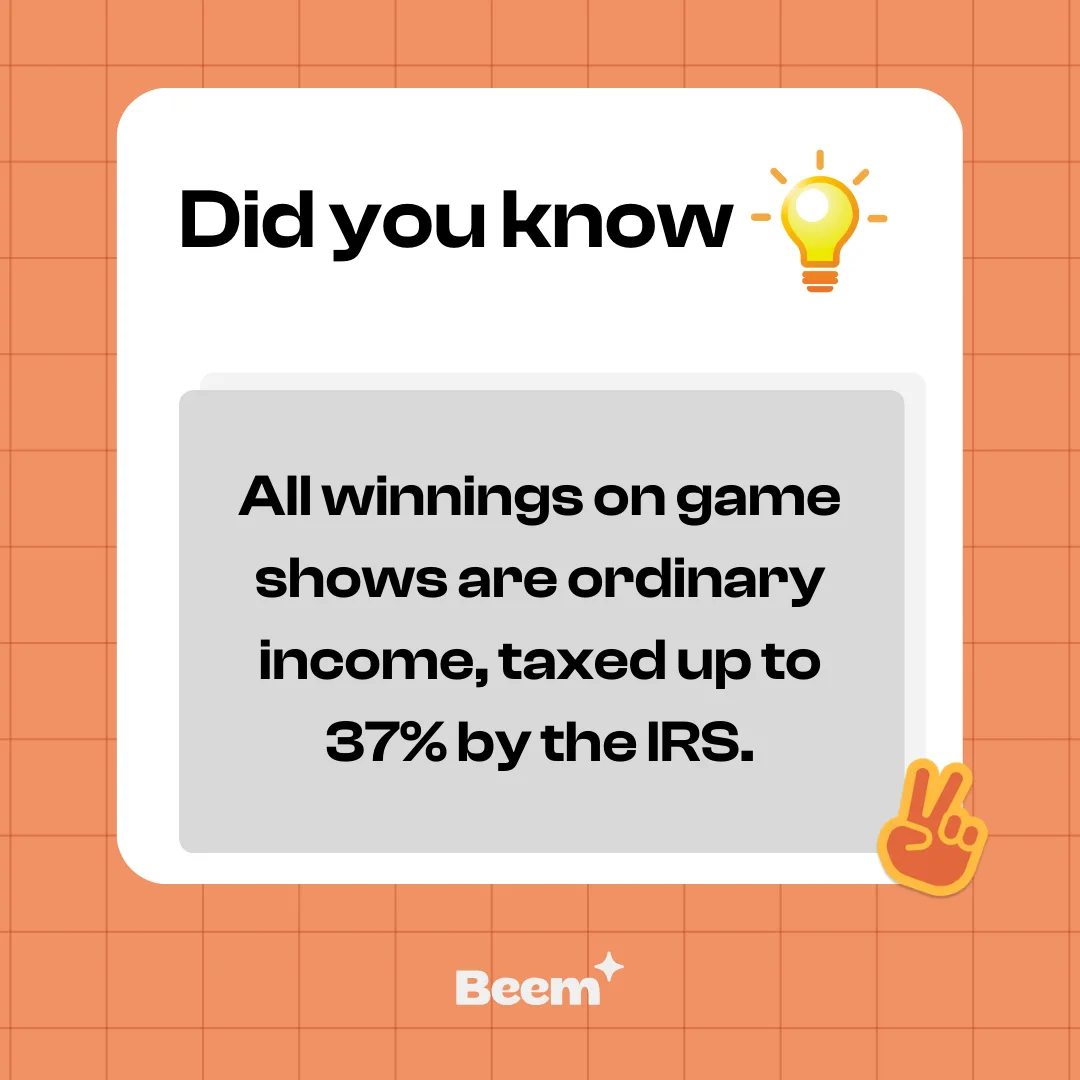Don’t worry, it’s not all bad news. We’ll go over the ins and outs of how game show winnings work and make sure you’re fully prepared for when lady luck comes knocking.
Taxes on Game Show Winnings and Prizes

Winning taxes are considered ordinary income by the U.S. federal government. Income sources such as awards, sweepstakes, and lotteries are included regardless of prize amounts won.
This holds even if the winner did not actively take part in the contest. State taxes may also apply, except in states that don’t have a state-level income tax.
So, winning money on a game show is almost always considered taxable income. The good news is there are some exceptions and ways to minimize your tax burden.
game show tax – US Taxes on Winnings and Prizes [Table]
| Category | Winning Amount | Federal Tax Rate | Additional State Tax? |
|---|---|---|---|
| Game Shows, Lottery, Gambling | Any amount | 24% (Federal withholding) | Varies by state |
| Online Gaming (Real Money Games) | Any amount | Up to 37% (based on income bracket) | Varies by state |
| Online Gaming (Tournaments and Competitions) | Any amount | Up to 37% (based on income bracket) | Varies by state |
| Awards and Prizes (Not affiliated with a game) | ≤ $600 | None | Varies by state |
| Awards and Prizes (Not affiliated with a game) | > $600 | Up to 37% (based on income bracket) | Varies by state |
Winning at least $600 is likely to result in a 1099-MISC tax form being sent by the awarding entity to both the winner and the IRS. If no form is received, the winner must still report the value of the winning. Merchandise won is also subject to taxation.
The amount of tax owed depends on the winner’s place of residence and the amount won. Federal taxes must be paid. However, some states without an income tax may provide some relief.
Key Summary of this article:
- Taxation as Ordinary Income: U.S. federal government taxes game show winnings, including prizes and awards, as ordinary income.
- Federal and State Taxes: Federal tax rate is 24% for withholding. State taxes vary, and some states do not impose an income tax.
- 1099-MISC Form: Winners of $600 or more will likely receive a 1099-MISC form for tax reporting.
- Taxable Categories: Both cash and the fair market value of non-cash prizes are taxable. Reimbursed expenses may or may not be taxable.
- Tax Management Tips:
- Pay taxes promptly to avoid penalties.
- If possible, opt for cash prizes to simplify tax obligations.
- Be aware of the true value of prizes to contest any inflated values.
- Consider declining a prize if the tax burden is too high.
- Declaration and Professional Advice: Contestants are typically informed about tax implications. Consulting a tax professional is advisable for specific guidance.
- Impact of Winnings on Taxes: The amount of tax owed depends on the winner’s total income and residence. Effective planning is essential to manage the financial impact of winnings.

Tax Implications of Prizes and Products Across the US
| Product Category | Taxable in US? | Additional Details |
|---|---|---|
| Cash | Yes | All cash winnings exceeding $600 are subject to federal income tax. Additionally, most states impose their own income tax on these winnings. |
| Non-cash prizes (cars, trips, merchandise) | Yes | The fair market value of the prize is considered taxable income for both federal and state governments. |
| Reimbursement of expenses | Depends | If the game show covers your travel or other expenses related to winning, the reimbursed amount might not be taxable. However, it’s essential to consult with a tax professional for specific guidance. |
Also Read: If I make $32,000 a year, how much will my tax return be?
What is the tax rate on game show winnings in California?
Game show winnings are considered ordinary income in California, which means they are taxed at your regular income tax rate. The California income tax rate ranges from 1% to 13.3%, depending on your taxable income.
In addition to state income tax, you will also be responsible for paying federal income tax on your game show winnings. The federal income tax rate ranges from 10% to 37%, depending on your taxable income.
Here is a table showing the estimated tax rates on game show winnings in California for different taxable income levels:
| Taxable Income | California State Income Tax Rate | Federal Income Tax Rate | Total Tax Rate |
|---|---|---|---|
| $0 to $11,000 | 1% | 10% | 11% |
| $11,001 to $14,950 | 2% | 12% | 14% |
| $14,951 to $19,800 | 3% | 12% | 15% |
| $19,801 to $25,050 | 4% | 12% | 16% |
| $25,051 to $31,550 | 5% | 22% | 27% |
| $31,551 to $42,750 | 6% | 22% | 28% |
| $42,751 to $53,700 | 8% | 22% | 30% |
| $53,701 to $65,450 | 9.30% | 22% | 31.30% |
| $65,451 to $107,350 | 10.30% | 24% | 34.30% |
| $107,351 to $150,000 | 11.30% | 24% | 35.30% |
| $150,001 to $328,700 | 12.30% | 32% | 44.30% |
| $328,701+ | 13.30% | 37% | 50.30% |
Please note that this is just an estimate, and your actual tax liability may vary depending on your individual circumstances. You should co
Question from Quora Forum: Assume on a game show someone won $20,000. Would the game show tax the winnings before awarding or does the winner receive the entire amount and it’s their responsibility to report?
The winner does not receive the entire amount upfront with taxes deducted by the game show. Instead, the winner receives the entire amount and is responsible for reporting the winnings as taxable income and paying any applicable taxes. The game show will issue a Form 1099 to the winner for tax reporting purposes.
Example Tax Table for Game Show Winnings in the United States
| Total Income Including Winnings | Federal Tax Rate | Example Game Show Winnings | Estimated Federal Taxes Owed |
|---|---|---|---|
| Up to $10,275 | 10% | $1,000 | $100 |
| $10,276 to $41,775 | 12% | $5,000 | $600 |
| $41,776 to $89,075 | 22% | $10,000 | $2,200 |
| $89,076 to $170,050 | 24% | $25,000 | $6,000 |
| $170,051 to $215,950 | 32% | $50,000 | $16,000 |
| $215,951 to $539,900 | 35% | $100,000 | $35,000 |
| Over $539,900 | 37% | $200,000 | $74,000 |
how much tax do you pay on game show winnings
- IRS taxation of the game show winnings in the US:
- A 1099-MISC form will likely be sent to you and the IRS by the awarding entity if your winnings are at least $600.
- The IRS imposes a 30% withholding tax on the gross value of the prize, similar to lottery winnings.
- Reclaiming withholding tax for non-US residents:
- Part or all of the 30% withholding tax may be recovered by offsetting it with gaming losses incurred in the same year.
- Involves navigating the US tax system and filling out the appropriate forms, such as Form 1040NR and 1042-S.
- Requires providing US gaming documentation from the same calendar year.
What are the state tax rates for game show winnings in different states?
Game shows can be thrilling, but don’t forget that hefty prizes often mean hefty taxes. Our state-wise table helps you estimate how much of those winnings might go to the government. Remember, this is just a guide – always consult a tax professional for specific advice.
| State | Federal Tax Rate | State Tax Rate |
|---|---|---|
| Alabama | 10-37% | 2-5% |
| Alaska | 10-37% | 0% |
| Arizona | 10-37% | 2.99-3.5% |
| Arkansas | 10-37% | 1-5.9% |
| California | 10-37% | 1-13.3% |
| Colorado | 10-37% | 4.55% |
| Connecticut | 10-37% | 3-6.99% |
| Delaware | 10-37% | 0% |
| Florida | 10-37% | 0-5.5% |
| Georgia | 10-37% | 0-6.75% |
| Hawaii | 10-37% | 4.95-5.4% |
| Idaho | 10-37% | 1-7.6% |
| Illinois | 10-37% | 4.75% |
| Indiana | 10-37% | 3.30% |
| Iowa | 10-37% | 0.78-5.7% |
| Kansas | 10-37% | 2.25-5.5% |
| Kentucky | 10-37% | 5-6% |
| Louisiana | 10-37% | 2% |
| Maine | 10-37% | 5.75-8.9% |
| Maryland | 10-37% | 5.75% |
| Massachusetts | 10-37% | 5.10% |
| Michigan | 10-37% | 4.25% |
| Minnesota | 10-37% | 2.85-9.85% |
| Mississippi | 10-37% | 3-5% |
| Missouri | 10-37% | 5.40% |
| Montana | 10-37% | 1-6.9% |
| Nebraska | 10-37% | 3.46%-6.84% |
| Nevada | 10-37% | 0% |
| New Hampshire | 10-37% | 5% |
| New Jersey | 10-37% | 1.75-8.97% |
| New Mexico | 10-37% | 1.70% |
| New York | 10-37% | 6.85-8.82% |
| North Carolina | 10-37% | 5.50% |
| North Dakota | 10-37% | 2.90% |
| Ohio | 10-37% | 3.30% |
| Oklahoma | 10-37% | 2.55-5.25% |
| Oregon | 10-37% | 0% |
| Pennsylvania | 10-37% | 3.07% |
| Rhode Island | 10-37% | 3.2-6.2% |
| South Carolina | 10-37% | 3-6.9% |
| South Dakota | 10-37% | 0-4.6% |
| Tennessee | 10-37% | 0-6.75% |
| Texas | 10-37% | 0% |
| Utah | 10-37% | 1.455-5.955% |
| Vermont | 10-37% | 3.33%-8.95% |
| Virginia | 10-37% | 2-5.75% |
| Washington | 10-37% | 0% |
| West Virginia | 10-37% | 3% |
| Wisconsin | 10-37% | 4.84% |
| Wyoming | 10-37% | 2-3.9% |
Also Read: Tax rate on game show winnings in California
are game show winnings taxed
Yes, game show winnings are generally considered taxable income in most countries, including the United States.
In the United States:
- Any cash or fair market value of non-cash prizes exceeding $600 is considered taxable income.
- The game show will typically withhold taxes at the source and issue you a 1099-MISC form to report the winnings to the IRS.
- The tax rate on your winnings will depend on your overall income and filing status.
how to declare game show winnings on taxes
Declaring game show winnings on your taxes can be straightforward, but the specifics might vary depending on your location and the value of your winnings. Here’s a general guide:
Taxability:
- Yes, game show winnings are considered taxable income in most countries. This applies to both cash and non-cash prizes (like cars, vacations, etc.).
- The value of the prize, including fair market value for non-cash prizes, should be reported as “income from other sources” on your tax return.
Reporting:
- If your winnings exceed a certain threshold, you’ll likely receive a Form 1099-MISC (Certain Gambling Winnings) from the game show. This form will report the amount of your winnings to the IRS and automatically include it in your taxable income.
- Even if you don’t receive a 1099-MISC, you’re still responsible for reporting your winnings. Keep good records of your participation and winnings for documentation.
If you win a Million Dollars on a Game Show, How Much is Taxes
If you win a Million Dollars on a Game Show, You can expect to pay around 30-40% of your winnings in federal taxes.
Non-cash Prize Game Show Winners
Winning non-cash prizes can come with some unwanted consequences, like having to pay taxes on their fair market value. But here’s the catch, game shows often value prizes at the highest retail price, not what it would actually sell for.
For instance, a trip could be valued at top dollar, not the discounted rate you could get from a travel agent or online.
This could leave the winner with a huge tax bill they can’t afford and penalties from the IRS if they can’t pay it. To dodge this issue, one option is to decline the non-cash prize, or if it’s something easy to sell, sell it (but not to a relative or friend). But beware, if you plan on reselling the item, you might end up paying taxes on a value you can’t recoup, leaving you with less profits.
Tips to Manage Game Show Winnings
- Pay taxes: Remember to pay any applicable taxes on your prize as soon as possible to avoid penalties.
- Choose cash over objects: If you have the option, choose cash instead of an object. If you win a $15,000 vacation, ask if you can have the money to avoid paying a large tax bill on a supposedly ‘free’ trip.
- Know the true value of your prize: The entity giving you the prize may inflate the value for their benefit. Make sure you know the true value and contest it if necessary.
- Consider declining a prize: If you win a prize that comes with a large tax bill, consider declining it if you are not financially able to pay the taxes. The real reward may come from walking away.
- Use cash prizes to cover tax bills: Cash prizes can cover associated tax bills. But it may not be worth the trouble if you have to scrounge for cash to pay the taxes on objects or vacations.
It’s a good idea to speak with a tax professional to determine if estimated tax payments are necessary. The payer may not need to withhold income taxes from your winnings. However, once the tax implications are taken care of, you may still have enough winnings left to shop.
If You win $50000 on a game show how much is taxed
If You win $50000 on a game show, the exact amount of taxes you’d owe in the US depends on a few factors:
1. Your filing status: Are you single, filing jointly, head of household, etc.? This determines which tax brackets apply to your winnings.
2. Your existing income: The $50,000 is added to your other taxable income for the year, potentially pushing you into a higher tax bracket.
3. State taxes: Some states have their own income taxes, which would apply to your winnings in addition to federal taxes.
However, we can give you a general estimate based on the assumption you’re single and have no other income in 2023:
- Federal taxes: Using the 2023 federal income tax brackets for single filers, you’d owe about $4,617.50 in federal taxes on the $50,000 winnings. This assumes you fall into the 22% tax bracket after adding the winnings to your existing income.
- State taxes: Depending on your state, you might owe additional taxes. For example, California has a state income tax rate of 1% to 13.3%, so you could owe anywhere from $500 to $6,650 in state taxes.
do you pay taxes on game show winnings
Yes, in the United States, you do pay taxes on game show winnings. These winnings are considered ordinary income, just like your salary or any other income you earn. This means you’ll be taxed on the full amount of the winnings, regardless of whether you receive it in cash, merchandise, or other prizes.
do game show contestants pay taxes on their winnings
Yes, game show contestants in the United States are required to pay taxes on their winnings. The Internal Revenue Service (IRS) considers game show prizes, along with other winnings from contests, lotteries, and gambling, as taxable income.
If you win $10000 on a game show how much is taxed
If you win $10000 on a game show, you can expect to pay around 25-37% of your winnings in federal taxes.
are game show contestants advised about taxes on winnings before
Yes, game show contestants are typically advised about the taxes on winnings before participating.
Do you have to Pay Taxes on Wheel of Fortune Winnings
Yes, you do have to pay taxes on Wheel of Fortune winnings. All game show winnings, including those from Wheel of Fortune, are considered taxable income by the IRS. The amount you owe will depend on your income tax bracket and state of residence.
Do you have to pay taxes on money you win from games?
Yes, in most cases, you do have to pay taxes on money you win from games, including:
- Lottery winnings: These are generally considered income and taxed at your ordinary income tax rate.
- Casino winnings: Winnings from slot machines, table games, and other casino games are also considered income and taxed at your ordinary income tax rate. However, there is a $1,200 per year exclusion for slot machine winnings, and you can deduct your losses up to the amount of your winnings.
- Game show winnings: Winnings from game shows are also considered income and taxed at your ordinary income tax rate.
- Raffles and contests: Winnings from raffles and contests are generally considered income and taxed at your ordinary income tax rate.
File your taxes with Beem. Estimate your Federal and State taxes with Beem’s Free Tax Calculator. Enjoy hassle-free tax filing with our 100% accuracy and get the maximum refund. Get started now.




























